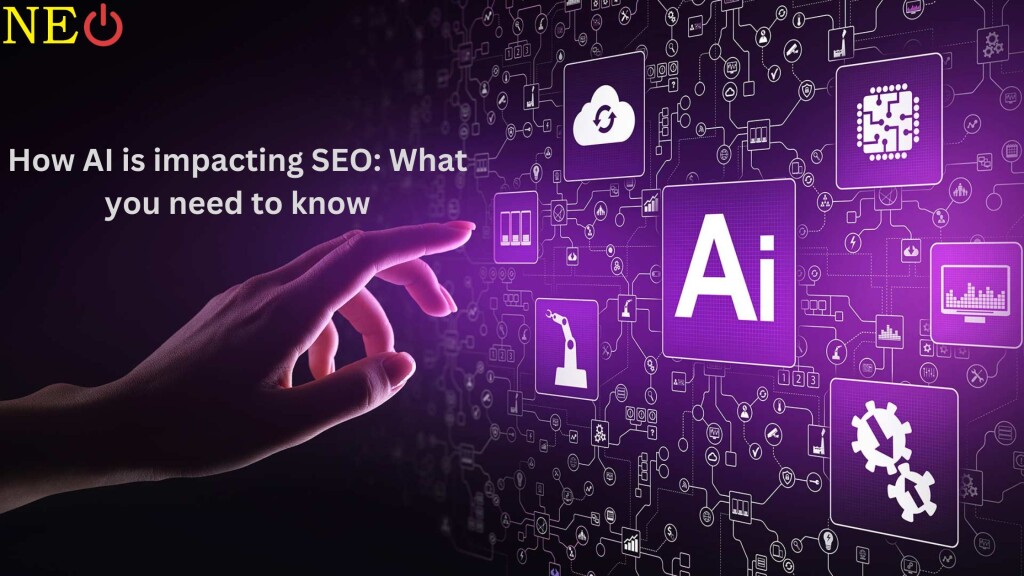Artificial Intelligence (AI) has profoundly impacted various industries, and SEO (Search Engine Optimization) is no exception. In 2024, AI is reshaping SEO strategies, tools, and techniques, making it essential for marketers to stay updated. This blog explores how AI influences SEO, its benefits, challenges, and the future landscape.
Comprehension AI in SEO
AI in SEO involves using machine learning algorithms and natural language processing (NLP) to optimize content, enhance user experience, and improve search engine rankings. Major search engines like Google use AI-powered algorithms, such as RankBrain and BERT, to understand search queries and provide relevant results.
RankBrain and BERT
RankBrain, introduced by Google in 2015, uses machine learning to process and understand search queries. It helps Google interpret complex and ambiguous queries by analyzing patterns in vast amounts of data. BERT (Bidirectional Encoder Representations from Transformers), launched in 2019, further enhances search accuracy by understanding the context of words in a sentence, improving the interpretation of natural language.
AI-Powered Content Creation
AI tools like GPT-4 can generate high-quality content that is both relevant and engaging. These tools analyze vast datasets to produce content that aligns with user intent and search engine algorithms. AI can also assist in creating content briefs, optimizing headlines, and suggesting keywords.
Benefits of AI in SEO
Enhanced User Experience
AI helps in understanding user behavior, preferences, and intent, leading to improved user experience. By analyzing user data, AI can personalize content, recommend products, and optimize website navigation, making the user's journey more seamless and engaging.
Efficient Keyword Research
AI-powered tools can analyze large volumes of search data to identify relevant keywords and trends. These tools can predict keyword performance, suggest long-tail keywords, and uncover new opportunities, making keyword research more efficient and effective.
Advanced Data Analysis
AI excels in processing and analyzing large datasets, providing valuable insights into user behavior, traffic patterns, and conversion rates. These insights help marketers make data-driven decisions, refine their SEO strategies, and measure the effectiveness of their campaigns.
Automated SEO Tasks
AI can automate repetitive SEO tasks such as site audits, backlink analysis, and rank tracking. This automation saves time and resources, allowing SEO professionals to focus on strategic planning and creative tasks.
Challenges of AI in SEO
Algorithm Updates
Search engine algorithms are constantly developing, making it difficult to keep up with the changes. AI algorithms like RankBrain and BERT are updated regularly, and staying updated with these changes is crucial for maintaining and improving search rankings.
Data Privacy Concerns
Using AI to analyze user data raises privacy concerns. Marketers must ensure compliance with data protection regulations like GDPR and CCPA. Balancing personalization with privacy is essential to build trust with users.
Dependency on AI Tools
Over-reliance on AI tools can lead to a lack of creativity and human touch in content creation. While AI can assist in generating content, human input is necessary to ensure authenticity, originality, and emotional connection with the audience.
High Costs
Implementing AI technologies can be expensive, especially for small businesses. Investing in AI-powered tools and hiring skilled professionals to manage these tools may require significant financial resources.
The Future of AI in SEO
Voice Search Optimization
With the advent of smart speakers and virtual assistants, voice search has become increasingly popular. AI will play a crucial role in optimizing content for voice search by understanding natural language and conversational queries. Marketers need to focus on long-tail keywords and create content that answers specific questions.
Visual Search
AI-powered visual search technology allows users to search using images instead of text. Platforms like Google Lens and Pinterest are already leveraging visual search capabilities. Optimizing images with relevant metadata and creating visually appealing content will be essential for visual search optimization.
Predictive SEO
Predictive analytics, powered by AI, can forecast search trends and user behavior. This predictive capability will enable marketers to anticipate changes in search patterns and adjust their strategies proactively. Predictive SEO will help in staying ahead of competitors and capturing emerging opportunities.
Hyper-Personalization
AI will enhance personalization by delivering tailored content based on individual user preferences, behavior, and demographics. Hyper-personalization will improve user engagement, satisfaction, and loyalty, driving better SEO outcomes.
AI Ethics and Transparency
As AI continues to evolve, ethical considerations and transparency will become increasingly important. Marketers need to ensure that AI is used responsibly, avoiding biases and ensuring transparency in data usage and algorithmic decisions.
Conclusion
AI is transforming the SEO environment, offering numerous benefits such as enhanced user experience, efficient keyword research, and advanced data analysis. However, challenges like algorithm updates, data privacy concerns, and high costs must be addressed. The future of SEO will see advancements in voice search, visual search, predictive SEO, and hyper-personalization, making AI an indispensable tool for marketers. Staying updated with AI trends and best practices will be crucial for achieving SEO success in 2024 and beyond.









